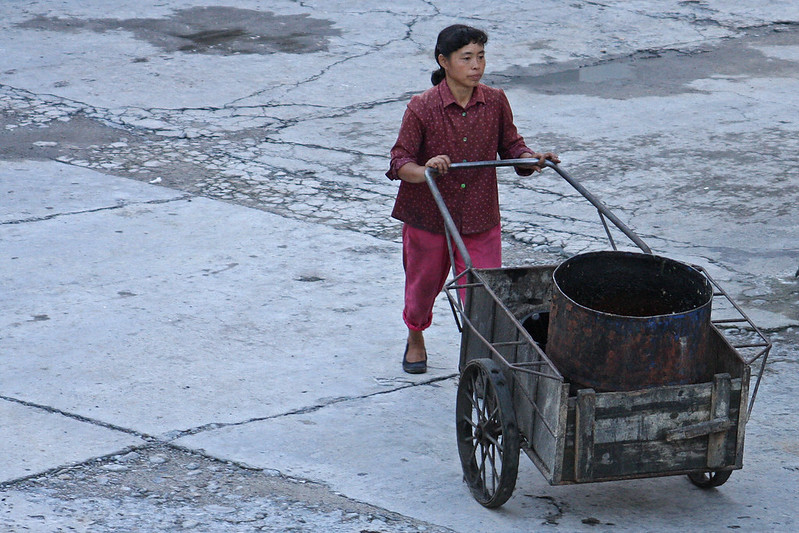3 Facts About Elderly Poverty in North Korea
 North Korea, a highly centralized totalitarian state with a population of nearly 25 million people, is a country that constitutes the northern half of the Korean Peninsula in East Asia. Over the past few decades, the country’s economy has faced significant challenges, including a scarcity of resources, international sanctions and self-imposed isolation. From 2012 to 2018, the country had an estimated poverty rate of 60% with significant fluctuations at the national level. Consequently, the country faces an aging population and a decline in the younger population caused by low birth rates. Despite its centrally planned economy, job stability in the workforce does not provide enough income, resulting in elderly poverty in North Korea.
North Korea, a highly centralized totalitarian state with a population of nearly 25 million people, is a country that constitutes the northern half of the Korean Peninsula in East Asia. Over the past few decades, the country’s economy has faced significant challenges, including a scarcity of resources, international sanctions and self-imposed isolation. From 2012 to 2018, the country had an estimated poverty rate of 60% with significant fluctuations at the national level. Consequently, the country faces an aging population and a decline in the younger population caused by low birth rates. Despite its centrally planned economy, job stability in the workforce does not provide enough income, resulting in elderly poverty in North Korea.
3 Facts About Elderly Poverty in North Korea
-
Increasing Rate of Poverty Risk Among the Elderly Population: North Korea’s elderly population, aged above 65 years, is rapidly rising. In 2008, the aging population increased from 5.3% to 8.5%, predicting a growth of 14% by 2033. Increasing demand to assist the elderly population in a country with low economic growth and sustained workforce opportunities brings income and health concerns.
-
Limited Pension System: North Korea has a limited pension system. It provides minimal support in providing financial assistance to the elderly. Reports from Radio Free Asia (RFA) indicate that the social security pension offers about 1,000 won per month. This is around $0.12. Many elderly citizens are unable to cover basic living expenses with limited income, leading them to remain in poverty and hindering their retirement plans.
-
Housing Conditions: Many elderly individuals live in poor housing conditions due to a lack of proper infrastructure. This leads to inadequate heating and structural issues. Roughly 90% of North Korea’s housing environment was constructed between the 1950s and 1990s. This was to solve the resulting housing crisis after the damage of numerous facilities and buildings during the Korean War in 1953.
Efforts of North Korean Authorities to Address Elderly Poverty
According to sources from Daily NK, an initiative was implemented by the Propaganda and Agitation Department of the North Korean communist party’s Central Committee to identify and register the homeless elderly population aged 60 years and above. It strived to build new facilities for nursing homes, aiming to provide care and support for abandoned or neglected elderly individuals. Nevertheless, North Korean citizens expressed concern regarding the initiative, with the possibility of elderly residents feeling compelled to return to their families despite the lack of resources to ensure proper caregiving. Additionally, there are speculations of potential mistreatment or neglect in the absence of familial support.
Efforts by NGOs in Alleviating Poverty
Non-governmental organizations (NGOs) strive to mitigate the struggles endured by the elderly population in North Korea. Although the government gives limited information on solutions, these NGOs endeavor to improve the quality of life for the elderly by providing assistance through their food aid program and awareness-raising initiatives.
Helping Hands Korea (HHK) is a Christian NGO that was founded by Tim and Sunmi Peters in Seoul. Since 1996, it has addressed the physical, emotional and spiritual needs of North Koreans in crisis. One of its projects aims to provide food, medicine and clothing to the most vulnerable in society, especially the elderly.
Other initiatives focus on promoting elderly poverty awareness to encourage governmental priorities and bring elicit action on the potential policies. In 2020, the United Nations released the “Needs and Priorities Plan.” It targeted the provision of humanitarian assistance while implementing sustainable development goals. It aims to give food and nutritional support to 3.3 million people in North Korea. The plan also will give health services to 5.5 million people and clean water and sanitation to 300,000 people.
Looking Ahead
North Korea is making efforts to overcome its challenges to improve its economy. While it may not be in the government’s best interest, collaboration with international organizations supports the funding of elderly poverty. With continued effort, North Korea could achieve a future that is free of elderly poverty. And this can potentially improve living conditions and reduce the burden on younger generations.
– Cherine Jang
Photo: Flickr
